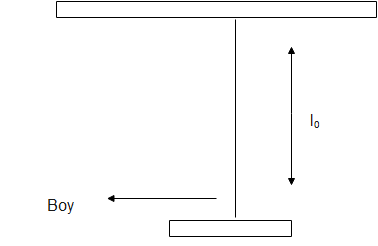Question
Question: In a garden a boy is swinging in the standing position how will the time period of the swing be affe...
In a garden a boy is swinging in the standing position how will the time period of the swing be affected if the boy sits down on the swing?
Solution
We have to take the effective length of a simple pendulum into account here. The effective length of a basic pendulum is the distance between the points of suspension and the centre of the bob. The longer the length of the string, the longer the pendulum falls; and thus the longer the duration of the pendulum or the swing back and forth. The greater the amplitude or angle, the farther the pendulum goes; and therefore, the longer the period.
Complete solution:

The whole system's angular momentum will be constant during this swing. So, angular momentum =I ω (where I is the system's moment of inertia and ω is the angular velocity).
Now when the boy sits down, the moment of inertia increases, well that's because, here we calculate the moment of inertia along that axis, from where the swing swings to and fro.
So, initially, his head was closer to the swing point than his legs, so his body mass was distributed along the radius, but the whole mass went towards the circumference when sitting, so I increased.
Now as the angular momentum is preserved, it is necessary to decrease Iω Now, we know, T=ω2π to increase I
We can also define Time period as this equation:
T=2π1mgLI
So, if ω decreases, it increases the time period.
Note:
Depending on the length of the individual sitting or standing on the swing, the time period of a swing can also vary. Since the time period is directly proportional to the square root of the swing's length, the time period may increase if the length increases and vice versa.
